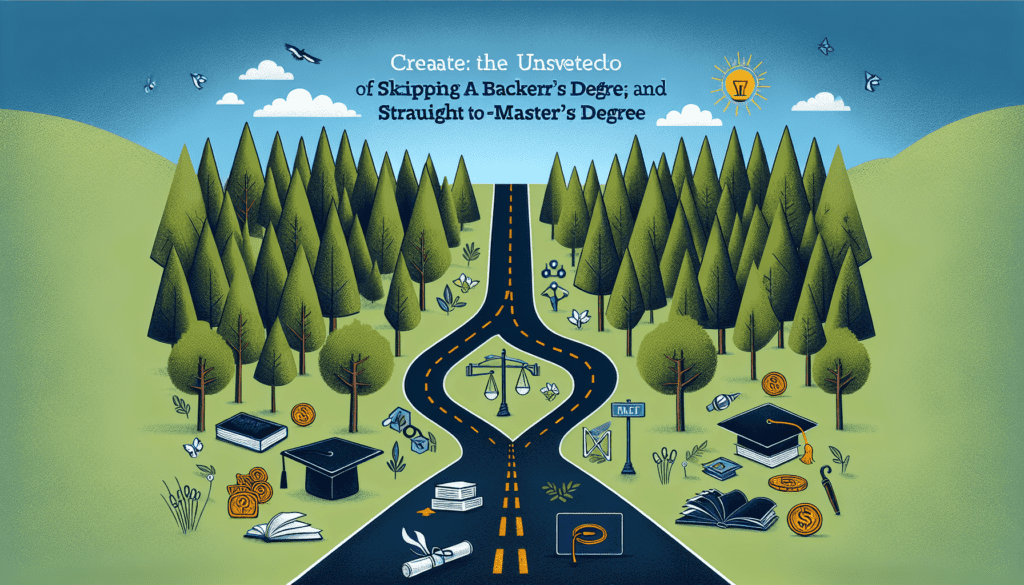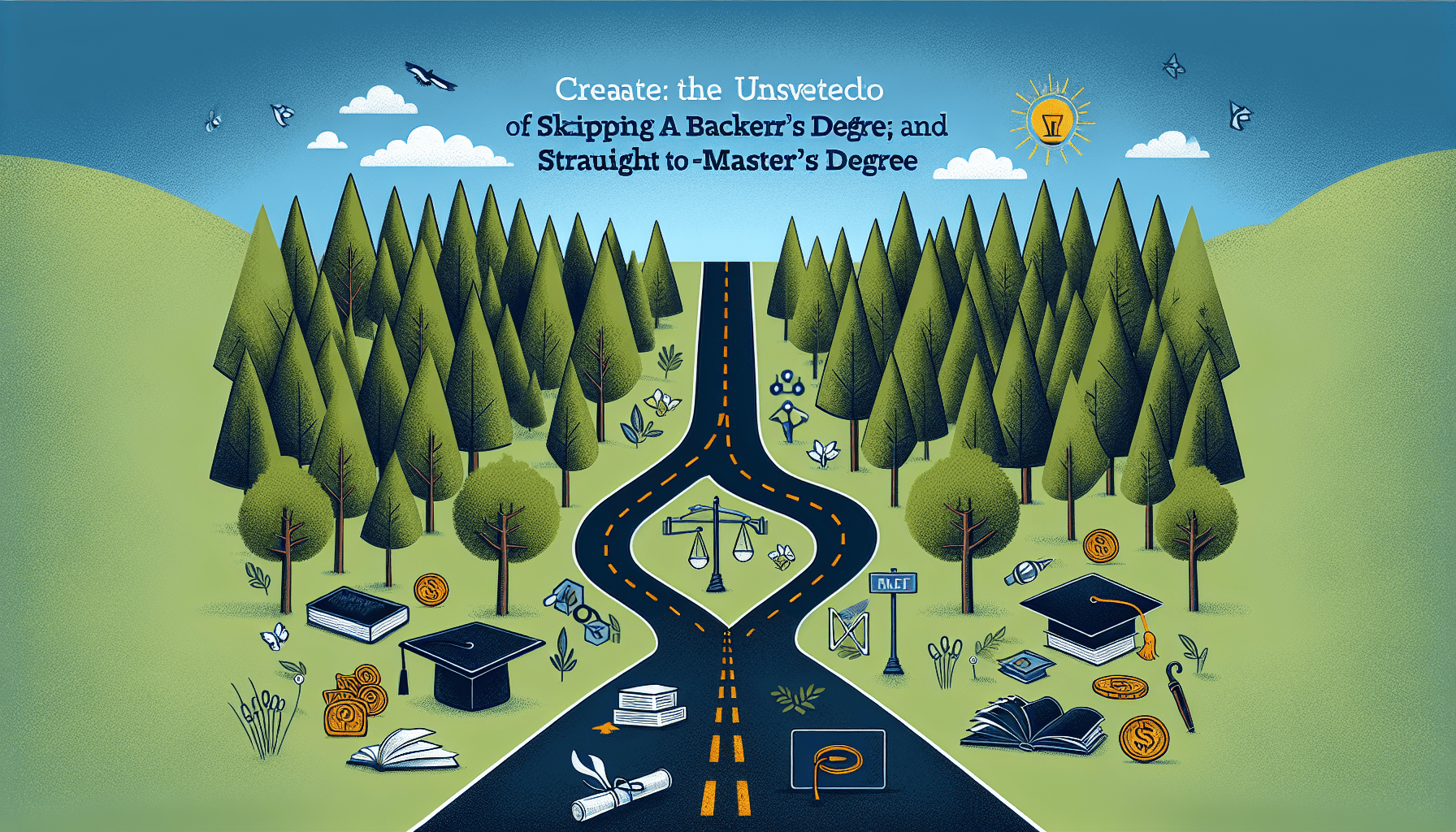In today’s competitive job market, many individuals are pondering whether it is possible to bypass a bachelor’s degree and jump right into pursuing a master’s degree. The notion of obtaining a higher level of education without dedicating four years to a bachelor’s program is enticing, but is it practically feasible? This article explores the feasibility and implications of circumventing the traditional educational path and delving directly into a master’s degree program.
Introduction
In today’s fast-paced and competitive world, higher education plays a crucial role in shaping an individual’s future prospects. Traditionally, the educational path has been to first obtain a bachelor’s degree and then pursue a master’s degree. However, with the changing landscape of education and the increasing demand for skilled professionals, there are emerging options that allow individuals to skip the bachelor’s degree and directly enter a master’s program. While this may seem like an enticing choice for some, it is important to understand the pros and cons, as well as the requirements and considerations associated with this alternative educational path.
Understanding the Traditional Educational Path
Before delving into the options of skipping a bachelor’s degree, it is essential to recognize the importance and benefits of a bachelor’s degree. A bachelor’s degree provides a solid foundation of knowledge and skills, encompassing various subjects and disciplines. It demonstrates a level of commitment, dedication, and intellectual capability to potential employers and graduate schools. Furthermore, a bachelor’s degree is often a prerequisite for admission into a master’s program.
On the other hand, pursuing a master’s degree typically requires certain prerequisites. These prerequisites vary depending on the specific program and institution but often include a bachelor’s degree in a relevant field of study, minimum GPA requirements, and sometimes standardized test scores, such as the GRE or GMAT. Additionally, gaining work experience before pursuing a master’s degree can provide individuals with valuable insights, practical skills, and networks that can enhance their educational journey.

Emerging Options to Skip Bachelor’s Degree
With the evolution of education and the demand for more time-efficient pathways, several options have emerged for individuals looking to bypass the traditional bachelor’s degree. Integrated programs, accelerated programs, and 5-year joint bachelor’s and master’s programs are all examples of alternatives that allow individuals to fast-track their educational journey and directly enter a master’s program.
Integrated programs combine undergraduate and graduate coursework in a seamless manner, allowing students to graduate with both a bachelor’s and master’s degree in less time than pursuing them separately. These programs are often interdisciplinary and provide students with the opportunity to develop specialized knowledge and skills early on in their academic journey.
Accelerated programs, as the name suggests, expedite the completion of a bachelor’s degree by compressing the curriculum or offering advanced placement opportunities. Once the bachelor’s degree is obtained, individuals can transition directly into a master’s program, saving both time and resources.
5-year joint bachelor’s and master’s programs allow students to simultaneously pursue a bachelor’s and master’s degree in a specific field. These programs integrate undergraduate and graduate coursework, enabling students to graduate with both degrees in five years instead of the usual six (four for a bachelor’s and two for a master’s). This option provides an efficient pathway for individuals looking to gain specialized knowledge and skills early in their career.
Benefits of Skipping Bachelor’s Degree
Choosing to skip a bachelor’s degree and directly enter a master’s program offers several advantages. One significant benefit is the time saved. By bypassing the four-year undergraduate program, individuals can complete their education and enter the workforce or pursue further academic endeavors at an accelerated pace. This time saved can then be utilized to gain valuable work experience or start one’s professional career.
Alongside time savings, skipping a bachelor’s degree can also result in financial benefits. Pursuing a master’s program typically requires substantial financial investment, and skipping a bachelor’s degree reduces the overall cost of education. Additionally, entering the job market earlier can mean the potential for earning a higher income at an earlier stage in one’s career.
Another advantage of skipping a bachelor’s degree is gaining a head start in one’s career. By entering a master’s program earlier, individuals can specialize in their desired field and acquire advanced knowledge and skills that can set them apart from their peers. This can lead to better career opportunities, quicker advancement, and increased job prospects.

Challenges and Considerations
While the benefits of skipping a bachelor’s degree can be appealing, it is important to consider the challenges and limitations associated with this alternative path. One notable challenge is limited specialization options. Bachelor’s degrees typically provide a broad scope of knowledge across various subjects, whereas master’s degrees are more focused and specialized. By skipping the bachelor’s degree, individuals may miss out on a more comprehensive knowledge base and may have limited options when it comes to choosing a specific field of study within their master’s program.
Another consideration is the potentially higher academic workload. Master’s programs are often more rigorous and demanding than undergraduate programs. By skipping the bachelor’s degree, individuals may find themselves facing a steeper learning curve, requiring additional effort and dedication to adapt to the academic challenges of the master’s level.
Fields where Skipping Bachelor’s Degree is Possible
Skipping a bachelor’s degree and directly entering a master’s program may be more feasible in certain fields. Continuing education in the same field is a common scenario where individuals may be able to skip the bachelor’s degree. For example, if someone already holds an associate degree or has completed vocational training in a specific field, they may be eligible for direct entry into a master’s program in that field.
In-demand fields with skill-specific qualifications also present opportunities to skip a bachelor’s degree. Industries such as technology, healthcare, and skilled trades often prioritize skill mastery and practical experience over formal education. Individuals who have developed highly sought-after skills or have obtained relevant certifications may have a higher chance of entering a master’s program without a bachelor’s degree.
Highly motivated and self-taught individuals who have demonstrated their expertise and knowledge in a particular field may also be considered for direct entry into a master’s program. These individuals often possess a strong portfolio of work or have made significant contributions to their field, showcasing their competence and commitment.
Requirements for Direct Entry to Master’s Programs
While the option to skip a bachelor’s degree and go straight to a master’s program exists, it is essential to meet certain requirements for consideration. Strong academic records, including high grades and a solid foundation in relevant subjects, are typically expected. Additionally, excellent test scores on standardized exams such as the GRE or GMAT can further strengthen an application.
Relevant professional experience in the field of study can also be a valuable asset for individuals looking to enter a master’s program directly. This experience demonstrates practical knowledge, skills, and a commitment to the field. Exceptional recommendation letters from professors or employers who can attest to the individual’s abilities and potential can also make a significant impact on the application.
A well-crafted personal statement or statement of purpose that highlights an individual’s motivation, goals, and alignment with the chosen master’s program is crucial. This statement allows individuals to showcase their passion, dedication, and potential contributions to their chosen field of study.
Exploring Alternatives to Traditional Education
Skipping a bachelor’s degree is not the only alternative to traditional education. Online learning platforms have become increasingly popular, providing flexible and accessible educational opportunities. These platforms offer a wide range of courses and programs that allow individuals to gain specialized knowledge and skills without the need for a formal degree.
Technical certifications are another alternative option for those looking to enhance their skills and credentials. These certifications validate expertise in specific areas, opening doors to job opportunities and career advancement. Professional development courses, workshops, and seminars are also valuable options to consider, as they provide targeted learning experiences and industry-specific knowledge.
Job Market and Employer Perspectives
It is important to consider the job market and employer perspectives when making decisions about skipping a bachelor’s degree. While some employers may have a preference for candidates with a bachelor’s degree, others prioritize specific skill sets and practical experience. Fields such as technology, creative arts, and entrepreneurship often value practical abilities and demonstrated competence over formal education.
Obtaining a master’s degree can significantly enhance job prospects in many industries. It demonstrates a commitment to continuous learning, specialized knowledge, and advanced skills. Additionally, certain positions and roles may require a master’s degree as a minimum qualification. However, it is worth noting that different industries and companies have varying degree requirements, and in some cases, relevant work experience and skills may outweigh the need for a bachelor’s degree.
Final Considerations and Personal Choice
Ultimately, the decision to skip a bachelor’s degree and directly enter a master’s program is a personal one that should be based on careful consideration of individual circumstances and long-term aspirations. Factors such as determination, motivation, and readiness to take on a potentially higher academic workload should be weighed against the benefits of saving time and money and gaining a head start in one’s career.
It is also crucial to recognize that each educational path comes with its own advantages and disadvantages. Traditional education provides a comprehensive knowledge base and broad skill set, while alternative routes allow for specialization and specific skill acquisition. Individuals should assess their personal goals, interests, and strengths to determine the best fit for their educational journey.
In conclusion, while skipping a bachelor’s degree and directly entering a master’s program is an emerging option in education, it is essential to thoroughly understand the requirements, challenges, and considerations associated with this alternative path. By carefully weighing the benefits and drawbacks, considering field-specific requirements and employer perspectives, and aligning personal aspirations, individuals can make an informed choice about their educational endeavors and future career prospects.

